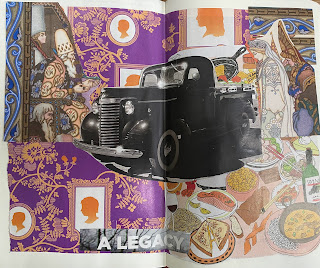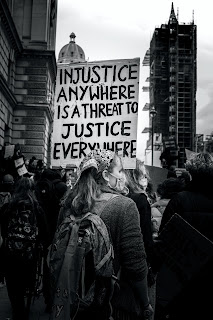Day 4 and 5 - The ethical obligation to develop a critical consciousness about power
 |
| Photo by Elisabeth Arnold on Unsplash |
Day 4 and 5 – Expressive arts therapy, like its sibling creative arts therapy professions, must ask itself the complex question of how we can disentangle our theory and practice from a counseling stance or helping profession that does not acknowledge the “broader socio-political discourse” (Norris, 2020b, p. 2). Norris (2020a) calls for a “radical imagining” within the international field of music therapy. She insists that “anti-Black violence, systemic oppression, and other acts of injustice” exist not only as reflections of larger cultural issues, but also within the very culture of music therapy itself via its “racially-evasive” and “depoliticized” theory, training, research, and practice (Norris, 2020b, p. 2).
The same critique and call for a re-imagining must be taken up by expressive arts therapy. Early definitions of the field of expressive arts therapy note that the possibility of an integrated arts approach is rooted “in the possibilities of sensory expression originating in the lived bodily experience and…the unity of the imagination as a creative source of meaning” (Levine & Levine, 1999, p. 11). But it is within these very “lived bodily experiences” that socio-politically charged violence is done. Norris (2020a) reminds us that this violence is done to and by our students, our clients, our communities, and ourselves.
In describing bell hooks’ contributions to emancipatory knowledge production and transformative revolutionary action, Fitts (2011) notes, that hooks proposes a “persistent confrontation with and dismantling of imperialist white supremacist capitalist patriarchy” (p. 124). Our inability to recognize the infiltration of these intersecting systems of oppression within our theory, training, research, and practice in the arts therapies has led to this moment where a re-defining of our work has become an “ethical imperative” (Norris, 2020b, p. 2).
Fitts, M. (2011). Theorizing transformative revolutionary action: The contribution of bell hooks to emancipatory knowledge production. The CLR James Journal, 17(1), 112–132.
Norris, M. (2020a). A call for radical imagining: Exploring anti-Blackness in the music therapy profession. Voices: A World Forum for Music Therapy, 20(3), 6. https://doi.org/10.15845/voices.v20i3.3167
Norris, M. (2020b). Freedom dreams: What must die in music therapy to preserve human dignity?. Voices: A World Forum for Music Therapy, 20(3), 4. https://doi.org/10.15845/voices.v20i3.3172



Comments